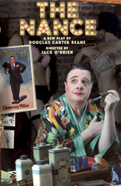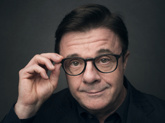Douglas Carter Beane Recalls How a Book, a Retreat & a Screen Saver Inspired Broadway's The Nance
About the author:
Four-time Tony nominee Douglas Carter Beane is showing audiences another side of his talent in the new Broadway play The Nance, a burlesque-set drama starring Nathan Lane about gay life in 1930s New York. Beane has, of course, created memorable and hilarious scripts for Sister Act, Xanadu, Lysistrata Jones and the current hit revival of Cinderella, as well as the acclaimed plays The Little Dog Laughed and As Bees in Honey Drown and the screenplay of the cult hit To Wong Foo Thanks for Everything, Julie Newmar. In the essay below, he writes about how his latest Broadway creation was born from a book, a screen saver and a serendipitous retreat.
![]()
I never really know when I start shows, but The Nance is different. Back when I had my theater company Drama Dept., someone had the idea of doing an evening of burlesque sketches. I hightailed it up to the Lincoln Center Library one afternoon, pored over the old sketches and quickly realized that there were six or seven basic premises. Jokes and gags were then thrown in or out as a sort of theatrical Mad Libs. The unexpected fascination of this research was finding a character called simply "Nance." He seemed to appear in just about every sketch, and would either have a leading role or just six or seven lines but was a wildly hilarious parody of an effeminate gay man. He seemed innocent and charming, despite his many double entendres, and, wonderfully, was never a victim or an object of ridicule. He was there to just stop the show by being funny.
One night at the Lucille Lortel Theatre, we did my version of the burlesque sketches, swip swapping jokes and making up my own stuff as necessary. Gosh, let me try to remember—it was directed by Jeremy Dobrish and performed by Robert Ari, Peter Jacobson, Mary Testa, Becky Ann Baker, Kelly Bishop and, as the Nance, Bryan Batt. The audience just loved it. That part I really remember. I kept these sketches in my power book with no real plan to do anything with them. It was about this time that I began to read George Chauncey’s book Gay New York. If you don't have a copy, get one now; it is a terrific. And a third thing went into the mix: Being a theater history nerd, I found a picture by Berenice Abbott of the Irving Place Theatre, a beautiful building that once stood around the corner from my own home. It was a cool pic, and I was using it as my screen saver.
These three things were whirling about me without me knowing it when I got a call from Philip Himberg from Sundance, asking if I would be interested in going on an 18-day writer’s retreat in Wyoming. I’d be off in a cabin, and the only rule was that it had to be a brand new play without commercial affiliation. I was talking with Philip on the phone and was in the midst of passing, explaining that I was in the process of adopting my first child. Philip, a gay dad himself, told me that if I didn’t do a writer’s retreat now, I wouldn’t be able to for the next 18 years. Eighteen days, eighteen years...numbers speak to us sometimes.
So, off I went to Ucross, Wyoming, to a cabin with a charming view of lowing cattle and fracking wells with gourmet breakfasts, lunches and dinners dropped at my door at the appropriate times. I remember feeling panicked. I opened the Chauncey book and began to read about gay life in the late thirties and there was a passing reference to the Irving Place Theatre. I looked at my computer screen, and there it was. There was a reference to the balcony being a hangout for the “nance crowd.” "Nance", the word I knew from the burlesque sketches, which were also on my computer. Well in the words of Anita Loos’ Lorelei Lee, “Fate keeps on happening.”
I looked at two men sharing a cigarette on the cover of Gay New York, saw the name Chauncey and wondered to myself, "What would it have been like?" I then looked at the list of the names of the different sketches, “Meet Ya Round the Corner," "Peace and Quiet," "Stranger with a Kind Face," "A Little Something on the Side" and "Fallen Woman,” and realized it suggested the events of a love affair. So, I wrote the first scene, which took place in an automat, and quickly followed it with a comedy sketch. I looked at the two of them together and thought, "My Lord, what actor on earth could do that scene and then that sketch?" I thought of Nathan Lane and then chuckled to myself. “Yeah, right—like that could happen.”
I left Wyoming with seven extra pounds from the gourmet meals and the first act and first scene of the second act of a play called The Nance. And now, eight years later, here we are, opening on Broadway, produced by Lincoln Center Theater and directed by Jack O'Brien. With Nathan Lane. What happened in those eight years? I think I forget.

